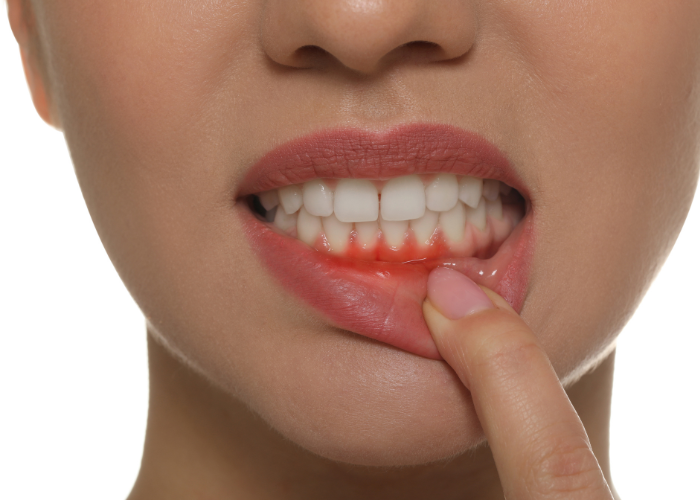Managing your diabetes successfully might not always be easy, but did you know that taking care of your oral health could also have an impact on your blood sugar level?
Dr Chris Wood
Dental Implant Surgeon
BDS MFGD, Dip Imp Dent (RCS Eng) FFGDP (UK) GDC No: 57428

Your mouth matters
Looking after your oral health is something most of us do well and probably don’t give too much thought to, but did you know that if you’re living with diabetes it’s even more important to take care of your mouth?
Diabetes is caused when your body has a problem producing insulin, which controls your blood sugar levels. Type 1 diabetics don’t produce any insulin at all whilst Type 2 diabetics produce insulin but either don’t produce enough or it is not effective. Both conditions are serious and can cause complications elsewhere in the body and whilst oral health might not be the first thing that springs to mind, problems in your mouth can be both caused by, and the consequence of, diabetes.
Tooth decay, infection, irritation, sores, and tooth loss can all be linked to diabetes. But it doesn’t have to be that way, with some regular care and awareness of what to look out for you can reduce the risk of gum disease and keep your mouth healthy and pain-free.

Gum Disease
Gum disease is a common condition, but the risk is increased for diabetics as an increased blood sugar level weakens the body’s white blood cells which are the first line of defense against infection.
The disease is caused by bacteria forming on teeth, which then produce toxins that can inflame the gums. Untreated, this can result in loss of bone mass and gum recession which ultimately causes tooth loss, known as periodontitis.
The other issue is that gum disease itself can increase your blood sugar level and exacerbate other complications of diabetes within the heart, blood vessels, eyes, kidneys, and nerves. However, if you have good control over your blood sugar level then that massively reduces the risk of gum disease.
In short, it’s a catch-22, neglect your mouth and it will have a negative impact on your diabetes, neglect your diabetes and it will be detrimental to your oral health.
Studying saliva
In poorly managed or undiagnosed diabetes, high blood sugar levels can mean more sugar in saliva, creating the perfect breeding ground for plaque which then attacks the enamel and dentine of the teeth, causing cavities.
In addition, there is the possibility of developing oral thrush, which can be a thoroughly unpleasant condition. The fungal infection thrives in sugary areas, and as diabetics generally have higher levels of glucose in their saliva it can be an infection to watch out for before it begins to cause pain and create sore patches.
Diabetes can also reduce the flow of saliva to the mouth which can make it dry, more prone to infection, slower to heal, and susceptible to soreness and ulcers.
Take charge
Whilst this can all sound worrying, the good news is that there are some easy ways to reduce the risk of problems arising.
Brush, brush, brush
It’s an obvious one, but if you take care of your teeth fewer problems will arise. Brushing and flossing twice a day will reduce the number of bacteria, keeping your mouth clean and free from gum disease and decay. If you’re already suffering from gum recession, then make sure you use an interspace brush instead of floss for a more thorough clean.
Regular check-ups
Every six months you should be heading to the dentist for a thorough check-up and clean. As dental specialists, we are able to spot issues early on, that you may not even have noticed. And in the case of gum disease, early intervention is always better (and less costly!) than trying to cure a long-term problem.
Stub it out
There really are no positives to smoking. It weakens your immune system, making it harder to fight infection, plus if you already have gum disease then smoking will mean it takes your gums longer to heal. Make it a new year’s resolution and give up today.
Healthy diet
A varied diet, full of healthy food and low in sugar is a real boost for the body, but it also helps to keep your mouth healthy as well. Stick to sugar-free drinks, avoid too many tempting, sugary snacks and your mouth will thank you for it.
Clean those dentures
If you wear dentures, then keeping them clean and fresh is essential. Without cleaning, a build-up of fungi can grow on the dentures resulting in a thrush infection in the soft tissue underneath your denture.
Periodontal specialists
Being aware of the issues is key to all of this. If you start to suffer from bleeding gums, loose teeth, bad breath or your teeth become more sensitive to temperature when you have a drink, then it’s time to make an appointment with your dentist.
At Audley not only do we boast our very own Periodontal (gum disease) Specialist, Dr Rachel Manning, but we also have a highly skilled dental team who are hugely experienced in dealing with periodontitis, gingivitis, and other oral health concerns.
We offer a personalised service to our patients in Oxfordshire and Buckinghamshire, taking the time to understand their concerns and working with them to devise a clear treatment plan. With periodontitis, we cover everything from tackling and treating plaque and decay to educating our patients on preventative measures that can be introduced at home to avoid the recurrence of any problems. We reassess our patients two to three months after the initial visit to see whether further treatment is required.
If you’re concerned about diabetes and complications with your own oral health, or you’d just like to talk through preventative steps to take then please get in touch on 01280 848945 or visit our website.

